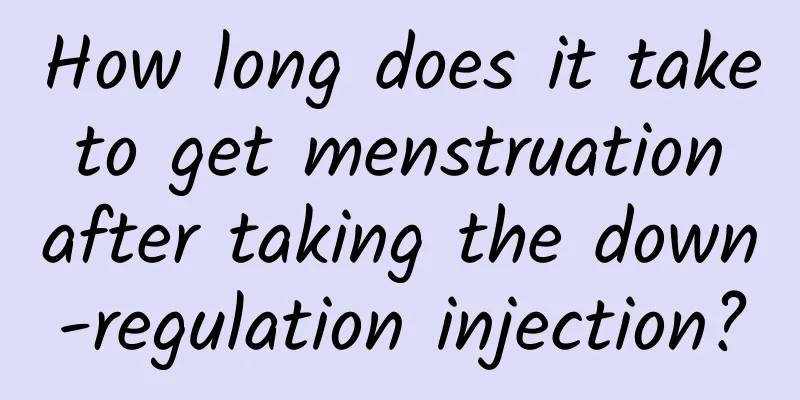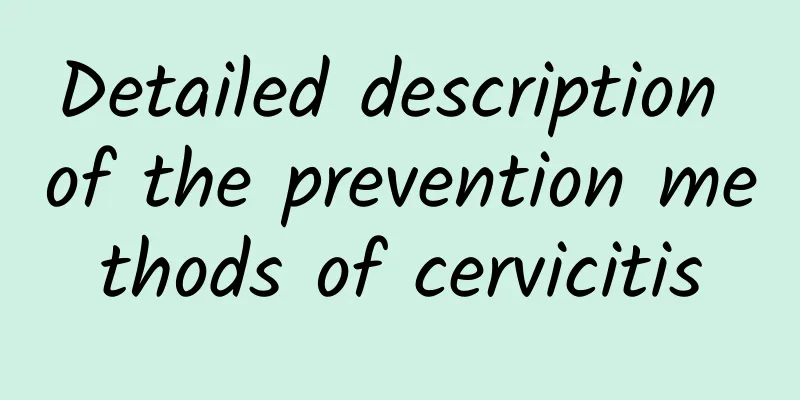How long does it take to get menstruation after taking the down-regulation injection?

|
After the down-regulation injection, menstruation usually comes according to the original cycle, but some women may have a slight delay. Down-regulation injection is mainly used to promote ovarian ovulation and usually does not affect the menstrual cycle. 1. Mechanism of action of down-regulation needle Down-regulation injection is a drug used to promote ovulation by stimulating the ovaries to mature multiple follicles. This can increase the chance of pregnancy, especially when undergoing assisted reproductive technology. Although it affects the activity of the ovaries, it generally does not have a significant impact on the menstrual cycle. Most women will have their menstrual period on time after the injection. 2. The impact of individual differences Everyone has a different body type, so their response to the down-regulation injection may vary. Some women may find that their menstrual cycle is slightly delayed by about a week than usual. This is usually not something to worry about, as in most cases it will not have a long-term effect on future menstrual cycles. 3. Possible pregnancy If menstruation has not occurred for more than a week after the down-regulation injection, the possibility of pregnancy needs to be considered. At this time, it is recommended to go to the hospital for a blood test, such as HCG test, to determine whether pregnancy is present. If the possibility of pregnancy is ruled out, further sex hormone six-item test may be required to rule out other causes such as endocrine disorders. 4. Precautions for drug use When using down-regulation injections and other ovulation-inducing drugs, be sure to do so under the guidance of a doctor. Self-use may lead to ovarian hyperstimulation, abdominal pain or other discomfort. The doctor will adjust the dosage and medication regimen based on individual conditions to ensure safety and effectiveness. 5. Adjustment of lifestyle It is also important to maintain a good lifestyle during the use of down-regulation injections. A reasonable diet, moderate exercise and a good mental state can help the body better cope with the effects of the drug. If any discomfort or concerns arise, it is very necessary to communicate with the doctor in time. 6. Concern about long-term impact Although down-regulation injections generally do not have a long-term effect on future menstrual cycles, if persistent menstrual irregularities or other abnormalities occur after use, you should seek medical attention in a timely manner. The doctor will evaluate and treat the specific situation to ensure the reproductive health of women. By understanding the mechanism of action of down-regulation injections and using them appropriately, you can better manage your menstrual cycle and reproductive health. If you have any questions or discomfort, consulting a professional doctor in a timely manner is the best way to ensure safety and health. |
<<: At what age will menopause occur if only one ovary is left?
>>: Why haven't I had my period for two months?
Recommend
How to check cervical and uterine adhesions
Examination of cervical and intrauterine adhesion...
What is the reason why menstruation often comes every two or three months?
What is the reason why menstruation often comes e...
Endometriosis etiology and pathogenesis
The etiology and pathogenesis of endometriosis ha...
What department should I go to the hospital to see when I have menopause?
Women attach great importance to their menstruati...
What is perimenopausal syndrome
Perimenopausal syndrome is commonly known as meno...
What is a giant uterine leiomyoma? Can a giant leiomyoma be treated?
What is a giant uterine leiomyoma? Can a giant le...
What harm does dysmenorrhea have on women's health?
Dysmenorrhea is a phenomenon that many women have...
Experts briefly analyze the common methods of checking ectopic pregnancy in women
Clinically, severe ectopic pregnancy can endanger...
Does cervical erosion need treatment?
Does cervical erosion need treatment? Cervical er...
Three symptoms of cervicitis that you must know
What are the symptoms of cervicitis? Gynecologica...
What is the cause of vulvar leukoplakia?
Many people have heard of vulvar leukoplakia and ...
Is it easy to cure a woman's miscarriage?
Many people ask if miscarriage is easy to cure. F...
What is the cause of pelvic inflammatory disease?
Pelvic inflammatory disease refers to inflammatio...
The main causes of adnexitis in women
Adnexitis is a disease that many women often suff...
What are the most obvious symptoms of cervical hypertrophy?
The most common disease in the cervix is cervic...









